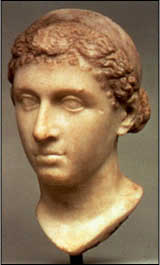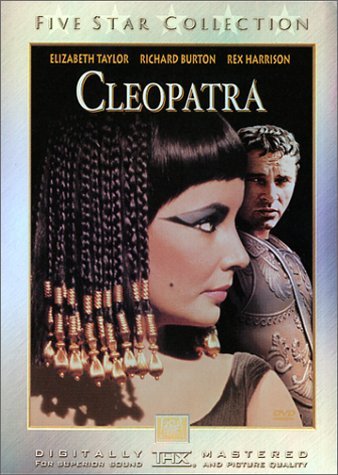1902 Encyclopedia > Cleopatra (Cleopatra VII Thea Philopator)
Cleopatra
(full name: Cleopatra VII Thea Philopator)
Queen of Egypt
(69-30 BC)
CLEOPATRA, the name of several Egyptian princesses of the house of the Ptolemies. The best known was the daughter of Ptolemy Auletes, born 69 B.C. Her father left her, at the age of seventeen, heir to his kingdom jointly with her younger brother Ptolemy, whose wife, in accordance with Egyptian custom, she was to become. A few years afterwards her brother, or rather her guardians, deprived her of all royal authority. She withdrew into Syria, and there made preparation to recover her rights by force of arms.

Cleopatra
(full name: Cleopatra VII Thea Philopator)
(Bust of Cleopatra in the Altes Museum in Berlin, Germany)
It was at this juncture that Julius Caesar followed Pompey into Egypt, resolved to settle there, if possible, the existing dispute as to the throne. The personal fascinations of Cleopatra, which she was not slow in bringing to bear upon him, soon won him entirely to her side; and as Ptolemy and his advisers still refused to admit her to a share in the kingdom, Caesar undertook a war on her behalf, in which Ptolemy lost his life, and she was replaced on the throne in conjunction with a younger brother, to whom she was also contracted in marriage.
Her relations with Caesar were matter of public notoriety, and soon after his return to Rome she joined him there, in company with her boy-husband (of whom, however, she soon rid herself by poison), but living openly with her Roman lover, somewhat to the scandal of his fellow citizens.
After Caesar’s assassination, aware of her unpopularity, she returned at once to her native country. But subsequently, during the civil troubles at Rome, she took the part of Antony, on whom she is said to have already made some impression in her earlier years, when he was campaigning in Egypt.
When he was in Cilicia, she made a purpose journey to visit him, sailing up the Cydnus in a gorgeously-decked galley, arrayed in all the attractive splendor which Eastern magnificence could bring in aid of her personal charms. Antony became from that time forth her infatuated slave, followed her to Egypt, and lived with her there for some time in the most profuse and wanton luxury. They called themselves "Osiris" and "Isis," and claimed to be regarded as divinities. His marriage with Octavia broke this connection for a while, but it was soon renewed, and Cleopatra assisted him in his future campaigns both with money and supplies.
This infatuation of his rival with a personage already so unpopular at Rome as Cleopatra, was taken advantaged of by Octavianus Caesar (Augustus), who declared war against her personally. In the famous sea fight at Actium, between the fleets of Octavianus and Antony, Cleopatra, who had accompanied him into action with an Egyptian squadron, took to flight while the issue was yet doubtful, and though hotly pursued by the enemy succeeded in escaping to Alexandria, where she was soon joined by her devoted lover.
When the cause of Antony was irretrievably ruined, and all her attempts to strengthen herself against the Roman conqueror by means of foreign alliances had failed, she made overtures of submission. Octavianus suggested to her, as a way to his favor, the assassination of his enemy Antony. She seems to have entertained the base proposals, -- enticing him to join her in a mausoleum which she had built, in order that "they might die together," and where he fulfilled his part of the compact by committing suicide, in the belief that she had already done so.
The charms which had succeeded so easily with Julius and with Antony failed to move the younger Caesar, though he at once granted her an interview; and rather than submit to be carried by him as a prisoner to Rome, she put an end to her life -- by applying an asp to her bosom, according to the common version of the story -- in the thirty-ninth year of her age.
With her ended the dynasty of the Ptolemies in Egypt. Besides her remarkable charms of person, she had very considerable abilities , and unusual literary tastes. She is said to have been able to converse in seven languages. She had three children by Antony, and, as some say, a son, called Caesarion, by Julius Caesar. (W. L. C.)
The above article was written by Rev. William Lucas Collins, M.A; Hon. Canon of Peterborough, 1870-87; edited Ancient Classics for English Readers.
Cleopatra in Popular Culture

Elizabeth Taylor as Cleopatra and Richard Burton as Mark Antony
in the 1963 movie Antony and Cleopatra
|

